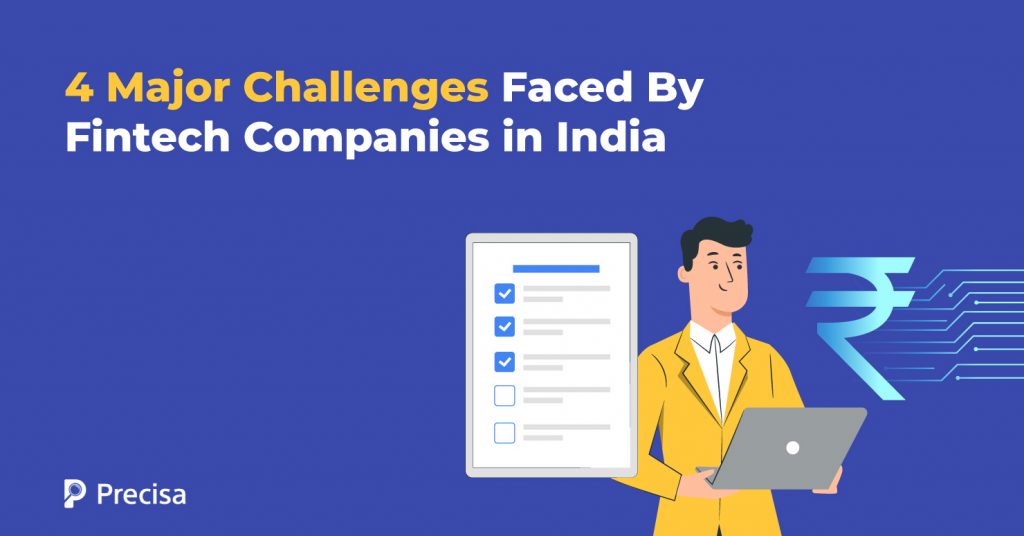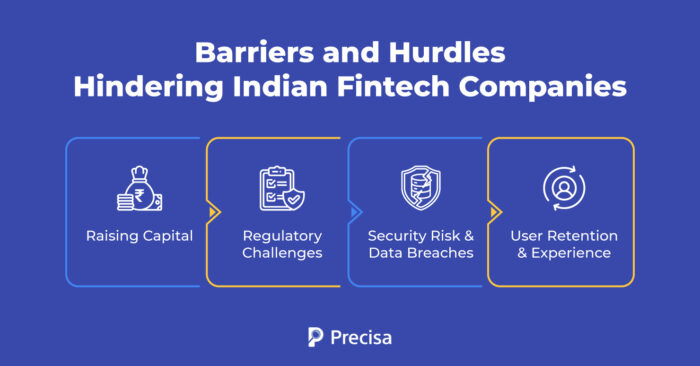4 Major Challenges Faced By Fintech Companies in India

As a young, innovative, and ambitious country, India is on the cusp of a tech revolution through extensive digitisation across all the major sectors, including manufacturing, healthcare, transport, agriculture, and finance.
Despite being relatively young, the financial technology (fintech) landscape offers tremendous promise. Thanks to the blend of robust and favourable government initiatives coupled with the significant rise in the number of fintech startups, India now has the third-largest fintech ecosystem in the world.
While the Indian fintech space was valued at $31 billion in 2021, it is expected to cross the $2 trillion mark by the end of 2030.
However, organisations need to navigate past several challenges to stay – and even survive. This blog post sheds light on some of the most glaring challenges and hurdles faced by fintech companies in India today.
Barriers and Hurdles Hindering Indian Fintech Companies

From intense competition, economic fluctuation, and regulatory challenges to infrastructure challenges, fintech companies are going through a maze of unfavourable challenges to compete and survive. Let’s look at some of the most significant roadblocks:
1. Raising Capital
Capital or funding is the lifeblood of any startup, which helps them survive, grow, and stay competitive. That said, startup founders and business leaders are aware that raising capital and attracting interest from the right investors is far from being a walk in the park involving waves of rejections and setbacks.
Additionally, investors seek detailed answers to several questions during due diligence to ensure their investment is in safe hands and whether there are any monetary and strategic benefits.
Convincing investors in this highly competitive landscape amidst a funding winter is a huge challenge and requires high attention to detail, a crystal clear roadmap of short and long-term plans, and more.
2. Regulatory Challenges
There is little doubt that fintech is one of the most trending topics in the Indian financial ecosystem. Despite being home to around 9,000 fintech companies, regulatory and compliance-related challenges and constraints pose major hurdles for the majority of fintech startups in the country today.
On one hand, Indian companies are aligned with the global trends in terms of technology and innovation. On the other hand, they are struggling to establish a solid foothold due to a complex regulatory framework.
Fintechs fall under the purview of several governing bodies, including SEBI, RBI, IRDAI, National Payments Corporation of India and more. Additionally, fintech companies need to adhere to different regulations, including the Master Directions – NBFC – P2P Lending Platform Directions, 2017, IT Act, 2000, Digital Personal Data Protection Act, 2023, Payment and Settlement Act, 2007, and more.
It leads to confusion over which laws apply to them, and recurring changes to these regulations continue to trouble fintechs today. In short, India’s fintech ecosystem is in dire need of single-umbrella legislation and stable laws.
3. Security Risk and Data Breaches
Fast-paced innovation, government endorsements for fintech initiatives like the UPI, and an exponential rise in smartphone usage have laid the foundations for a robust, dynamic fintech ecosystem. As mentioned earlier, despite these promising and encouraging signs, security risks and data breaches are becoming a huge concern in the present scheme of things.
The availability of large volumes of data in digital formats has accelerated the need to secure sensitive customer data from cyberattacks and other forms of digital threats. Additionally, as more and more consumers embrace digital financial tools and services, there is a growing need to establish and preserve consumer trust.
UPI-related frauds accounted for 55% of the total digital frauds in 2022-2023, rising to 95,000 cases against 84,000 cases reported in 2021-2022.
Security, privacy, and data breaches tarnish the reputation and credibility of a fintech company, resulting in a loss of trust in the highly competitive sector.
4. User Retention and Experience
Customer retention is another major challenge that continues to haunt fintech companies. As mentioned, the cut-throat competition and rapid technological advancement highlight the need to prioritise user retention and offer a seamless application experience.
While the number of downloads or users is a good measure of a company’s success, it does not guarantee it. If you need evidence to support that statement, here it is. Nearly 73% of new app users stop using or uninstall the app within a week after downloading or using it, emphasising the need to focus on user retention.
Businesses need to study and harness customer retention data to improve customer retention and ensure their customers are satisfied with the overall experience, range of services, and more. Companies can overcome retention-related challenges by incorporating social elements into their user communication, rolling out personalised push notifications from time to time and more.
Wrapping It Up
India’s financial ecosystem is currently undergoing rapid changes. From frequent changes and amendments to the existing regulations, the introduction of new laws, and stiff competition, fintech companies are battling it out to stay competitive and, more importantly, survive.
While regulatory challenges, along with the need to tighten and introduce robust security measures, pose major hurdles for Indian fintech companies, other barriers include low retention rates and funding.
Precisa offers cutting-edge solutions that aid our clients in serving their customers better. Our cloud-based finance data analytics solutions have helped hundreds of clients operating across the BFSI sector improve their bottom line, efficiency, and overall performance.
Contact us today to learn more!



